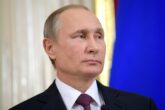March 30, 2019
The Building of Russia's Geopolitical Momentum
Since returning to office in 2012, Russian President Vladimir Putin has pursued a course of action that has enabled him to significantly enhance Russia’s position on the global stage. Putin’s growing assertiveness, and importantly the West’s failure to adequately respond to his moves, have allowed him to accumulate substantial geopolitical momentum during the last five years.
Putin has thwarted Ukraine’s ability to pursue a westward political trajectory in the short-term, even if Russian hostility has hardened Kyiv’s long-term commitment to the West. In Syria, Russian airpower altered battle field dynamics and shored up President Assad’s power. He has also used Syria as a spring board to project Russian influence throughout the Middle East, notably in both Saudi Arabia and Egypt – two long-standing U.S. partners. Additionally, Putin has won Moscow a seat at the table discussing responses to global hotspots such as Afghanistan, Libya, and North Korea. Public opinion polls reflect the growing international role that Russia is playing. In a 2018 Pew Research Poll, 42 percent of respondents across 25 countries agreed that Russia plays a more important role in the world today than it did ten years ago.
In addition to these direct actions, Putin has benefitted from changing dynamics in Europe and the United States. The polarization and division within Western societies – which Putin actively seeks to amplify – feed Russian (and Chinese) narratives that Western democracies are dysfunctional and cannot deliver on their promises. In Europe, Putin observes division and dysfunction in the United Kingdom preparing to exit the European Union, Hungary and Poland testing the resilience of E.U. institutions, the Yellow Vest protests plaguing France, a government in Sweden that took 130 days to form after elections this past Fall, and a populist government in Italy vocally supporting the lifting of sanctions on Russia. With respect to the political environment in the United States, Putin is likely satisfied with the return on investment he received with the election of Donald Trump: Trump’s degradation of America’s international reputation outweighs any blowback Russia has faced for its actions in the 2016 U.S. Election.
Read the full article in the Georgetown Journal of International Affairs.
More from CNAS
-
Trump ‘Humiliated’ as Putin Sends Clear Message That He Doesn’t Care About US
"Putin is not playing ball." Putin's Palm Sunday attack on Sumy is "embarrassing for the White House" as it comes just days after Steve Witkoff met with the Kremlin, says adju...
By Jim Townsend
-
The Hidden Past and Uncertain Future of the U.S. and Ukraine with Celeste Wallander
Under the Trump administration, U.S. support for Ukraine is no longer guaranteed. President Trump's pause on aid and intelligence to Ukraine in March may have been brief, but ...
By Andrea Kendall-Taylor, Jim Townsend & Celeste Wallander
-
Is Russia Under Pressure?
Since 2014, the United States and its allies have provided increasing military support to Ukraine while imposing more and tougher economic sanctions on Russia, especially sinc...
By Jeffrey Edmonds
-
Sharper: Russia and the Axis of Upheaval
Russia’s 2022 invasion of Ukraine served as a dramatic catalyst for strengthening the global axis of upheaval. To sustain its war effort, Russia has imported Iranian weapons a...
By Charles Horn




